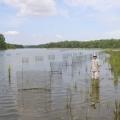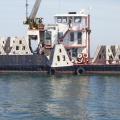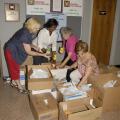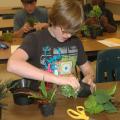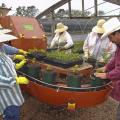Feature Story from 2009
MISSISSIPPI STATE – Carbon trading has been around for about a decade, but with the increasing global concern regarding climate change, it is receiving even more attention.
Forest landowners have the potential to generate additional income by using their forest for carbon sequestration, a method providing long-term storage of carbon dioxide.
MISSISSIPPI STATE – Rural communities in Mississippi and Louisiana have unique cultural atmospheres, attractions and small-town qualities that tourists enjoy.
The fourth annual Regional Tourism Summit of the Miss-Lou Rural Tourism Association can help community representatives identify these elements and design a creative marketing plan to bring visitors to the area.
The summit will be held Aug. 11-13 at the Paragon Casino in Marksville, La. The theme is “Gateways to Get-A-Ways: Preserving the Past, Preparing for the Future.”
By Jonathan Paul Fleming and Karen Brasher
MSU College of Forest Resources
MISSISSIPPI STATE -- Many anglers have long lived by the motto “grass equals bass,” and for a bass fisherman, there is nothing more thrilling than pulling a spinner-bait along a weed edge and getting a strike.
This simple motto is being investigated by researchers who say that the right type of vegetation in lakes and reservoirs can improve fishing opportunities.
MISSISSIPPI STATE – Fewer cotton acres in Mississippi mean less demand for cotton ginning, and whole communities in the Mississippi Delta are feeling the impact of the loss of their livelihood.
A cotton gin is the piece of equipment that separates the cotton seeds from the cotton. Eli Whitney mechanized this process for the first time in 1793.
MISSISSIPPI STATE – Mississippi State University research and Extension experts will provide information and demonstrations about agronomic research activities on July 14.
MSU’s Pontotoc Ridge-Flatwoods Branch Experiment Station will host its annual Research and Demonstration Tour. Registration begins at 7:30 a.m.
By Jason Brandt and Karen Brasher
MSU College of Forest Resources
MISSISSIPPI STATE -- The red snapper has proven to be an economically and culturally important fish species, but their numbers are declining throughout the Gulf of Mexico and the Atlantic.
To help address this problem, Mississippi State University scientists, in collaboration with the Mississippi Department of Marine Resources, are examining how artificial reefs might slow red snapper decline and assist in its recovery.
By Patti Drapala
MSU Ag Communications
MISSISSIPPI STATE – Mississippians who are firing up their grills have a valuable resource for tips and tricks in their community’s 4-H youth.
Youth who participate in the 4-H program of the Mississippi State University Extension Service sharpen their culinary skills by competing in the meats cookoff contest each summer. They often carry this experience into adulthood and become avid about the end result from barbecuing meat the correct way.
By Karen Templeton
MSU Ag Communications
MISSISSIPPI STATE – Busy schedules and hectic lives are making it increasingly difficult for families to prepare meals together and find the time to sit down to enjoy them.
By Steven Nalley
MSU Ag Communications
MISSISSIPPI STATE – Mississippi State University Extension Service county offices receive a wide range of questions from the state’s diverse population, and the office associates typically are on the front line of all incoming calls.
By Patti Drapala
MSU Ag Communications
MISSISSIPPI STATE – While Mississippi’s 3rd Congressional District celebrates its new No. 1 status in poultry production, industry insiders know Mississippi State University’s support made this achievement possible.
MISSISSIPPI STATE -- Mississippi State University veterinary students are not satisfied learning about animals themselves; they want to lay the educational foundation for future pet owners, as well.
Pet Awareness With Students, or PAWS, is a pilot project initiated by third-year Doctor of Veterinary Medicine students Shannon Vawter of Horn Lake and Katie Ebers of Jackson. The two students also are pursuing master’s in public health degrees in the MSU College of Veterinary Medicine’s dual-degree option.
MISSISSIPPI STATE – The interdisciplinary faculty at Mississippi State University’s Sustainable Energy Research Center, who are exploring how to convert plant biomass into renewable energy, will present their findings at the fourth annual MSU Biofuels Conference Aug. 6-7 in Jackson.
Researchers from the energy industry, other universities, laboratories, foundations and government agencies will join them at the conference to share information about sustainable, environmentally sound energy alternatives.
MISSISSIPPI STATE – As the economy continues to present challenges, an upcoming workshop will help new food business owners learn how to battle the stiff odds and have a better chance to succeed.
“Food as a Business” is a day-long video conference Aug. 11 with satellite locations at Mississippi State University and in Biloxi, Raymond, Verona and Cleveland. The $40 registration fee covers breaks, lunch and conference materials, and must be received by July 31.
MISSISSIPPI STATE – The initial impact of the H1N1 flu virus on communities was minimal last spring as schools were preparing to dismiss for the summer, but health officials warn that may not be the case this fall and winter.
Jane Clary, health specialist with Mississippi State University’s Extension Service, said in the months since the initial outbreaks were detected, the virus has grown to become an official pandemic, a disease outbreak that spans the world.
By Patti Drapala
MSU Ag Communications
MISSISSIPPI STATE -- Some parents use age to determine if children can stay home alone, but Mississippi State University experts say maturity level and problem solving skills are more important factors to consider.
Mississippi child protection laws back up this philosophy. The state sets no age limitation on children left alone at home, but guidelines issued by the Mississippi Department of Human Services emphasize the child’s maturity level as a gauge for parental decision making.
By Steven Nalley
MSU Ag Communications
MISSISSIPPI STATE – Mississippi has been a driving force in helping expand the National 4-H Council’s “Health Rocks!” program from a regional experiment to a national standard in less than a decade.
Health Rocks! began as one of 4-H’s Youth-Adult Partnership programs, in which two teenagers lead their peers with the help of an adult facilitator. Initially, the goal was to establish an anti-smoking program that would target 10- to 14-year olds.
MISSISSIPPI STATE -- College students moving away from home for the first time are often amazed at how much it costs to eat every day, and high consumer prices can make it harder than ever to eat well on a budget.
College students can expect to spend as much as 30 percent of their budget on food, said Susan Cosgrove, Mississippi State University Extension Service family resource management area agent. Especially in tough financial times, college students should identify all sources of income, then stick with a monthly budget that covers all expenses.
By Patti Drapala
MSU Ag Communications
MISSISSIPPI STATE -- Most high school students who attend Mississippi State University’s horticulture summer seminar do not become plant scientists or landscape architects, but the experience often shapes the way they approach their future vocations.
By Rebekah Ray
MSU Delta Research and Extension Center
STONEVILLE – Even though Sean Horton’s father discouraged him from pursuing a career in forestry and agriculture, the Greenville teenager was determined to follow his dream.
Since 1993, the younger Horton has worked as farm manager at Mississippi State University’s Delta Research and Extension Center in Stoneville, the university’s largest off-campus research center.
MISSISSIPPI STATE – It is common in Mississippi to see cattle grazing in pastures surrounded by trees, but researchers at Mississippi State University are looking into the feasibility of bringing it all into one field.
The goal of silvopasture systems is to use space and the growing season more effectively by combining trees or shrubs with forage and livestock production in the same acreage.
Pages
Feature Story Archive
- 2025 (11)
- 2024 (120)
- 2023 (114)
- 2022 (115)
- 2021 (105)
- 2020 (141)
- 2019 (127)
- 2018 (141)
- 2017 (199)
- 2016 (242)
- 2015 (320)
- 2014 (358)
- 2013 (374)
- 2012 (344)
- 2011 (248)
- 2010 (239)
- 2009 (229)
- 2008 (189)
- 2007 (210)
- 2006 (199)
- 2005 (224)
- 2004 (218)
- 2003 (228)
- 2002 (177)
- 2001 (184)
- 2000 (190)
- 1999 (182)
- 1998 (179)
- 1997 (188)
- 1996 (58)
- 1995 (36)

